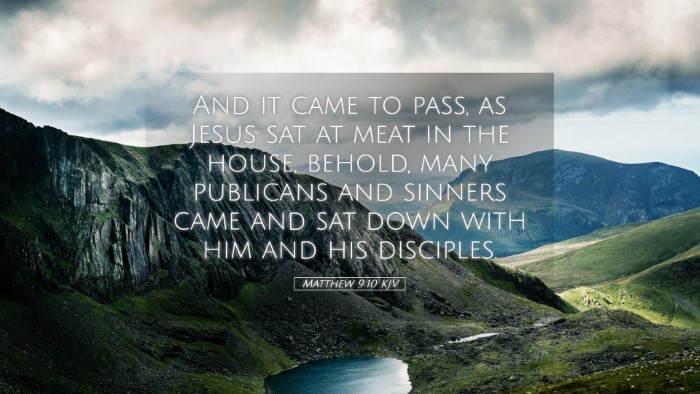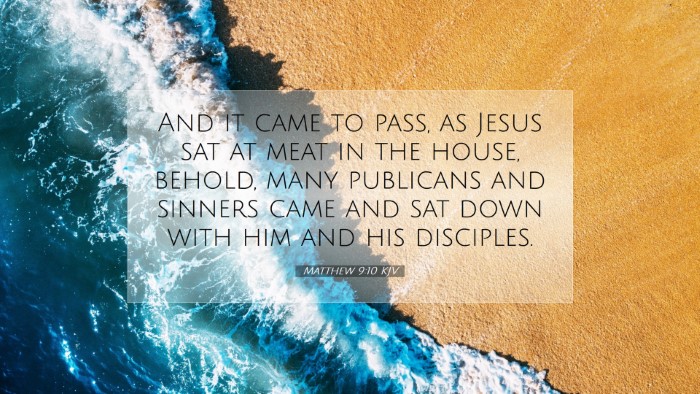Commentary on Matthew 9:10
Matthew 9:10 states: "And it happened, as Jesus sat at the table in the house, that behold, many tax collectors and sinners came and sat down with Him and His disciples."
Contextual Background
This passage occurs in the larger context of Jesus' ministry in Galilee. It highlights His growing popularity among the marginalized of society and sets the stage for His radical teachings on grace and inclusivity.
Matthew Henry's Insights
According to Matthew Henry, this verse reveals the nature of Christ's mission. He points out that Jesus chose to associate with tax collectors and sinners, illustrating His embodiment of grace. Henry elaborates:
- Association with the Marginalized: Jesus' willingness to engage with those considered outcasts reflects His heart for the lost.
- Table Fellowship: The act of sharing a meal carries significant social implications in the Jewish context, symbolizing acceptance and fellowship.
- Transformation through Association: By dining with sinners, Jesus not only provides them with acceptance but also creates a space for transformation.
Albert Barnes' Commentary
Albert Barnes emphasizes the significance of Jesus' interactions with tax collectors and sinners. In his view:
- Symbol of Rejection: Tax collectors were often despised in Jewish culture, seen as traitors working for the Roman occupiers.
- Broad Invitation: This meeting signifies that Christ's grace extends beyond the self-righteous to the openly sinful.
- Call to Repentance: In accepting these individuals, Jesus is also inviting them to repent and transform their lives.
Adam Clarke's Analysis
Adam Clarke provides a theological perspective, arguing that Jesus' actions demonstrate the essence of His ministry:
- Divine Mission: Clarke notes that Jesus came to seek and save that which was lost, illustrating God's heart towards sinners.
- Social Implications: The gatherings with sinners constitute a form of protest against the religious elitism of the Pharisees.
- Challenge to Norms: Jesus challenges societal norms that separate the 'righteous' from the 'sinners', advocating for inclusivity over exclusion.
Theological Implications
This verse carries profound theological implications for understanding the nature of salvation. It suggests:
- Inclusivity of the Gospel: The openness to all sinners points to the inclusive nature of the Gospel.
- Repentance and Grace: It emphasizes that true redemption often begins when individuals are welcomed into a grace-filled community.
- Formative Relationships: The communal aspect of faith suggests that transformation comes through relationships with others who are also seeking God.
Practical Applications for Ministry
For pastors and ministry leaders, the insights derived from this text can inform practical approaches to outreach and fellowship:
- Embrace the Outsiders: Churches should be intentional about welcoming those who feel cast out or marginalized.
- Foster Community: Create environments where believers and non-believers can engage in conversation and relationship.
- Teach Grace over Judgment: Emphasize the need for grace in interpersonal relationships, mirroring Jesus' example.
Conclusion
Matthew 9:10 serves as a powerful reminder of the radical love of Christ, who dines with sinners and extends an invitation to the marginalized. This verse encourages both theological reflection and action in our churches today, urging us to embody the spirit of acceptance and community that Jesus modeled.


